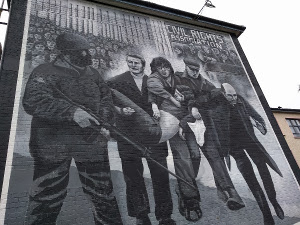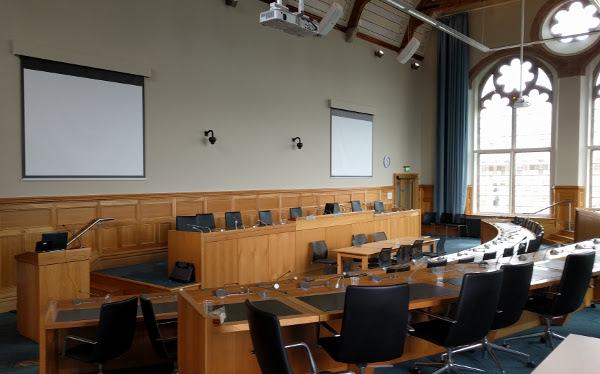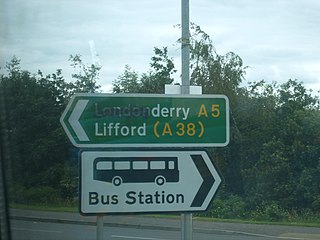Na Trioblóidí (The Troubles) is the appellation given to sectarian violence in Northern Ireland between the sixties and the Good Friday Agreement of 1998. During that time over 3,500 lives were lost. As with most armed conflicts, the majority of the deaths were civilian.

Bogside, Derry / Londonderry
Oh it is the biggest mix-up that you have ever seen
My father he was orange and my mother she was green
One day my ma's relations came round to visit me
Just as my father's kinfolk were all sittin' down to tea
We tried to smooth things over, but they all began to fight
And me being strictly neutral, I bashed everyone in sight
- The Orange and the Green by The Irish Rovers
On a recent trip to the United Kingdom and Ireland, I visited the Northern Ireland city of "Derry / Londonderry". It's dual name is a poignant reminder of its history and the ongoing tensions within the town.
The city of Derry dates back to the foundation of a monastery there in the sixth century. The name Londonderry was chosen by Ulster Plantationists, mainly Scottish Protestants given land in the north of Ireland confiscated from native, Gaelic Catholics by the government of King James 1 of Great Britain. This occupation sets the background for four centuries of intermittent war, assassination and sectarian violence.
Northern Ireland was formed in 1922 following the Irish War of Independence that separated the largely Protestant north from the newly created, Catholic, Irish Free State (which later became the Republic of Ireland in 1937). Those in the north maintained their strong links with the mainland as is recognised by the UK's official title of the United Kingdom of Great Britain and Northern Ireland.
Tensions arising from job and housing discrimination, no universal suffrage, a gerrymander and abuse of the extensive police powers by the largely Protestant police force boiled over into demonstrations, civil disobedience, riots and bombings. The emotional and economic toll on the community was severe.
Bogside is the Catholic area in Derry where many of the riots occurred. The murals on the walls of the tenement buildings still record the violence of the time.


It is said that it takes three generations for a country to recover from civil war. Throw in religious affiliations and reconciliation is slower again.

Irish Tour Guide, Ronan,
Shipquay Place, Derry / Londonderry
Our tour guide was a Gaelic speaking, former teacher, practising Buddhist, Irishman of Chinese extraction. Ronan has two young daughters and like all parents wants a better future for his children. Through his contact with people from all walks of life he is striving to improve life for his family, community and city. Perhaps it takes "outsiders", men and women like Ronan, with little religious "baggage" but a strong commitment to a better future to achieve a breakthrough.
Just outside the walls of the old city is the landmark Guildhall. Built in the 1890s it was bombed twice during the Troubles. Now restored, it is not only a tourist attraction, theatre and function centre but remains the home of the council as it has been since its inception. For a relatively small population the council is large with 38 councillors representing the seven wards of the district and the four major parties, with four independents. It takes a lot of talking to get things done in Derry but at least now everyone has a voice.

Derry and Strabane District Council Chambers, The Guildhall,
seating 38 councillors
Outside the Guildhall is the Peace Bridge linking the western Protestant side of the city to the old town and Bogside on the east. In 2013 the Dalai Lama walked across the bridge in the company of Protestant and Catholic children. His charge to them was, “The last century was the century of violence. This must be the century of peace. My generation's century is now gone, but the future is still in your hands.”
The Dalai Lama was visiting the city at the invitation of Richard Moore, director of the charity, Children in the Crossfire. Moore had been blinded by a plastic bullet at age ten. The Dalai Lama declared, "There is no other alternative to the peace process. There is no other choice - you have to work and live together, so we should not act like animals."

Peace Bridge, Derry (with the Guildhall in the background)
from the western shore of the Foyle River
Derry is living up to that message. The Irish group the Cranberries released their song Zombies in 1994. It touches on the long history of violence in Ireland and the effect childhood deaths have on families and society.
A few weeks after the song was released, the Irish Republican Army, after 25 years of fighting, declared a cease fire on 31 August 1994.
















